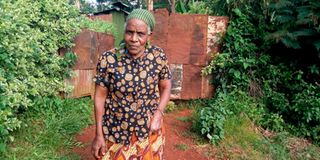I fought for 'uhuru', but I still live in a colonial village

Mau Mau heroine, Grace Njoki Mwangi popularly known as Kanguniu at her home in Ngunguru Village, in Mathira, Nyeri County.
What you need to know:
- Grace Njoki Mwangi was among the Mau Mau freedom fighters, when things went astray between 1951 and 1957.
- She is popularly known as Cucu Kanguniu, a name derived from her diligence, participated in the colonial war.
- She was among the Mau Mau informers; she later joined them in forests when the British discovered she was an accomplice.
When Grace Njoki Mwangi walks to the market, boards a matatu and commutes to a town or city without any restrictions, she is a happy woman.
There was a time people were held hostage in their places of birth. That was before Kenya gained independence June 1, 1963.
Ms Njoki, popularly known as Kanguniu was among the Mau Mau freedom fighters, when things went astray between 1951 and 1957.
The then governor of Kenya Sir Evelyn Baring declared a State of Emergency, due to the Mau Mau rebellion against British colonial rule and incarceration of thousands of Kenyans.
There was rebellion, almost exclusively in the highlands of Central Kenya.
Although she is not certain of the exact year she was born, she estimates sun rays first fell on her between 1940 and 1944.
“Our parents never kept records, as most of us were born at home. Again, technology was not as developed as it is today,” Njoki says.
Colonial war
Yes, Cucu Kanguniu, a name derived from her diligence, participated in the colonial war.
Her memory is active, and if you are told she was born in the 1950s, you would definitely believe it.
When we first speak to her on phone, we thought she had someone who handles her calls, until we met her in person.
As she ages, the medium height, brown and charming woman still recalls the sequence of events during Mau Mau war. But what surprises most, are her strong and intact white teeth.
If by any chance, she invites you to her home in Ngunguru village, Gathogorero, along Karatina-Mukurweini highway in Mathira, Nyeri County, she will surely offer you ripe bananas served in a half calabash.
Njoki never attended school, but is proud of her children, who she says she managed to educate. She was among the Mau Mau informers; she later joined them in forests when the British discovered she was an accomplice.
The spies' duty was to inform Mau Mau fighters of the whites soldiers (Johnny), colonial black soldiers and home guards’ movements.
They were also tasked to supply them with foodstuffs, drinks, cigarettes, tobacco and weapons, a move that energised the fighters facing the colonial government.
Njoki played a great role as a messenger.
“In 1952, a number of us were arrested and detained for a week. The colonial government demanded to know if we had been recruited, through swearing, to update Mau Mau fighters. Some of my friends were killed in the course,” she narrates.
Tumutumu forest
Nevertheless, Njoki insists she never gave up on the mission. Peace and freedom to her and for the coming generation was paramount. That’s all she needed.
In 1953, the search for spies was intensified. Njoki became one of the targets.
“I went into exile and joined the fighters in Tumutumu forest,” she recalls.
It’s during the escape that she suffered an injury on one of her legs.
“I was stung by a thorn, which exists in her leg to-date,” she explains, adding that medical efforts to remove it have been futile.
When the State of Emergency ended in 1957, Njoki’s diligence was recognised by fellow fighters. A song was even composed, praising her for saving more than a thousand lives. She was among the heroes and heroines who fought for Kenya’s independence.
Despite the challenges she encountered, sacrificing her soul for this country’s freedom, she still lives in a colonial village.
Njoki says she has not been issued with a title deed for the land to-date.
Mau Mau heroes
“President Uhuru Kenyatta promised to issue us with title deeds. We are still waiting,” she says, adding that the government has forgotten Mau Mau heroes and heroines' pleas.
As we celebrate 58 years of independence, Ms Njoki hopes the Head of State will one day honour his pledge, before he completes his term.
“When Mzee Jomo Kenyatta took over leadership in 1963, he urged us to work hard, and that is what I have been doing since. However, we should at least, be appreciated for our endeavours. The freedom we are enjoying, we painfully fought for it, in the course some died,” she explains.





